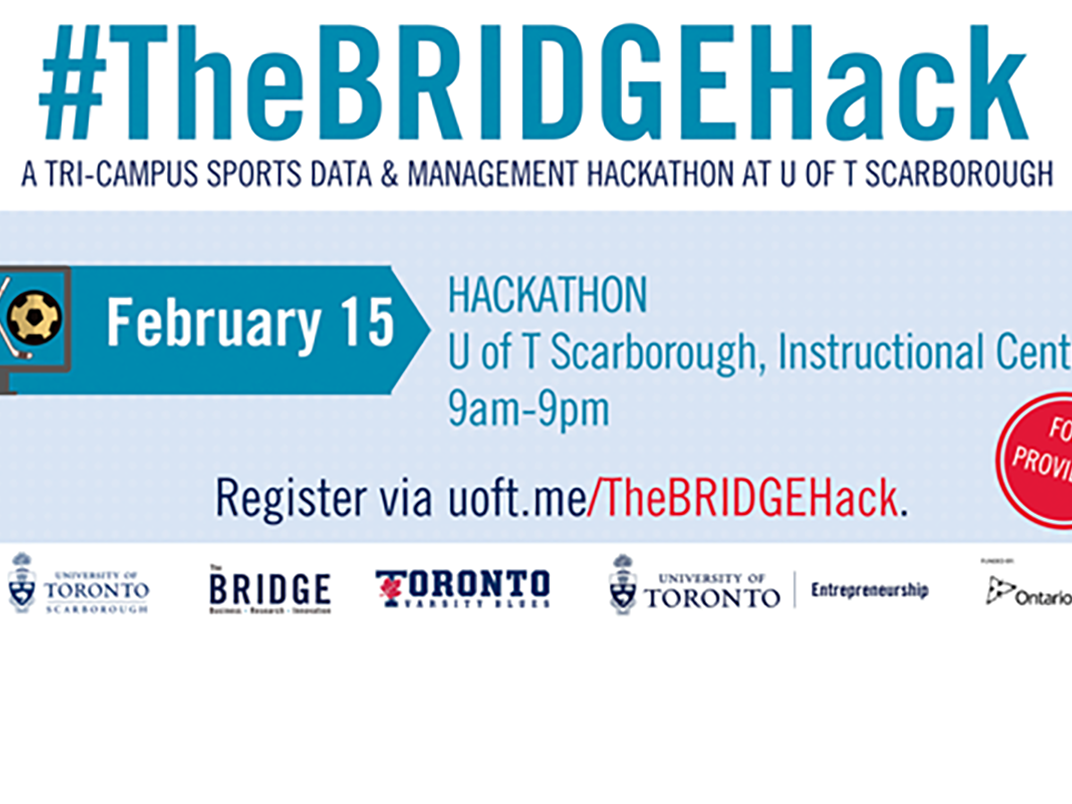
FRIDAY, FEBRUARY 15, 2019 - HACKATHON
INSTRUCTIONAL CENTRE, UNIVERSITY OF TORONTO SCARBOROUGH
1ST FLOOR, 1095 MILITARY TRAIL
Event from 9:00am-9:00pm
Are you interested in problem-solving? Meeting new people? And using your creativity to win prizes? Did we mention free food?
Using data and analytics from the University of Toronto Varsity Blues, University of Toronto student teams will compete in an intensive live-action event that demands innovative solutions to sports business quandaries.
Participants will have the opportunity to learn new skills from students in other disciplines, as well as U of T and industry mentors, including Olympian and founder of the Believe Initiative Sarah Wells.
This event is open to all U of T students. Learn more about #TheBRIDGEHack below and register now!
About the Hack
At The BRIDGE Hack, students will collaboratively develop unique ideas, designs, or solutions to sports management problems experienced by the University of Toronto Varsity Blues. Students will have the opportunity to hack on problems related to fan attendance and engagement. A variety of outcomes are acceptable, including business plans, presentations, low fidelity prototypes, data analysis or models, or web or mobile applications.
The event is open to registered undergraduate and graduate students across the University of Toronto's three campuses. Participants with any level of technical expertise are welcome. You will have the opportunity to learn new skills from students in other disciplines, as well as mentors from across campus and industry. Many different disciplinary perspectives or skill sets will be useful at the BRIDGE Hack, including but not limited to management, computer science, sports, data and analytics, and communication.
Timeline
| Date(s) | Event |
|---|---|
| February 7-14, 2019 | Complete optional modules |
| February 15, 2019 | The BRIDGE Hack event |
The Challenge(s)
Student engagement with Varsity Blues programming, which may include promotion, engagement during games, fan programs, and attendance analytics. This can be Fan attendance, including ticket sales, attracting new attendees, and retaining attendees. Issues may include attendance analytics and pricing modules. Also, this includes Fan engagement, such as promotion, engagement during games, and fan programs.
Day 1: February 6, 2019 4pm-7pm
| 4:00pm | Welcome
|
| 4:30pm | Team facilitation
|
| 5:30pm | Food |
| 6:00pm | Modules Idea sharing
|
| 6:30pm | Team facilitation continued
|
| 7:15pm | End of Kick-off |
Day 2: Hack Event February 15, 2019 9am - 9pm
| 9:00am | Breakfest and Caffeine |
| 9:15am | Welcome
|
| 9:30am | Project Idea Presentations
|
| 10:00am | Teams Form, Develop Idea, Hack |
| 11:00am | Break-out Session: Data Literacy (60 minutes) Send 1-2 delegates from your group to hear the presentation Followed by mentorship |
| 12:00am | Lunch |
| 1:00pm | Hack hack and hack |
| 1:30pm | More hacking |
| 3:00pm | Break out session: Presentation skills (60 minutes) Send 1-2 delegates from your group to hear the presentation Followed by mentors |
| 4:00pm | Order of presentations posted |
| 4:45pm | Submit presentations by 1645 |
| 5:00pm | End of Hacking Evening food |
| 5:15pm | Presentations start
|
| 6:45pm | Break and food |
| 7:00pm | Presentations continued
|
| 8:30pm | Presentations end, Judges deliberate, audience votes |
| 8:50pm | Winners announced, closing comments |
Team Formation
Students can sign up to the attend the hack's kick-off event individually. The kick-off will enable interested participants to learn more about the hack and form teams. Attendees will be encouraged to share their strengths, in order to form well-balanced teams, and to foster collaboration between participants from different disciplines.
Teams should consist of between 3 to 5 individuals. At least 1 member should be an undergraduate student. You are encouraged to form teams with students from various disciplines of study. We recommend having team members from the departments of management and computer science, a domain expert in sports, and a communications lead.
Students can officially register for the event on the day of the hack, individually or in teams. Participants must finalize their teams at the start of the hack.
Prior to Hackathon
Participants will only be presented with the general theme of the hackathon at the kick-off event. The specific problems will be revealed on the day of the hack. Therefore, we suggest you do not begin to code, design elements, or draft business and marketing plans before the event. However, you can research and brainstorm ideas leading up to the event.
In the week leading up to the Hackathon, teams are encouraged to complete three learning modules in order to develop their business and technical skills. The modules will focus on value propositions, market validation, and software engineering.
Code of Conduct
Demonstrate professionalism and be respectful of your fellow students and their ideas. Provide encouragement and constructive criticism for the benefit of the other attendees. University of Toronto is an inclusive environment and harassment in any form will not be tolerated.
Supplies
We encourage you to bring your own laptop to the Hackathon. Computer workstations are also available in the BRIDGE, but space is limited.
Judging Criteria
| Criteria | Presentation | Research | Functionality | Design Concept | Originality |
| Weight | 10% | 20% | 30% | 20% | 20% |
| Notes |
|
|
|
|
|